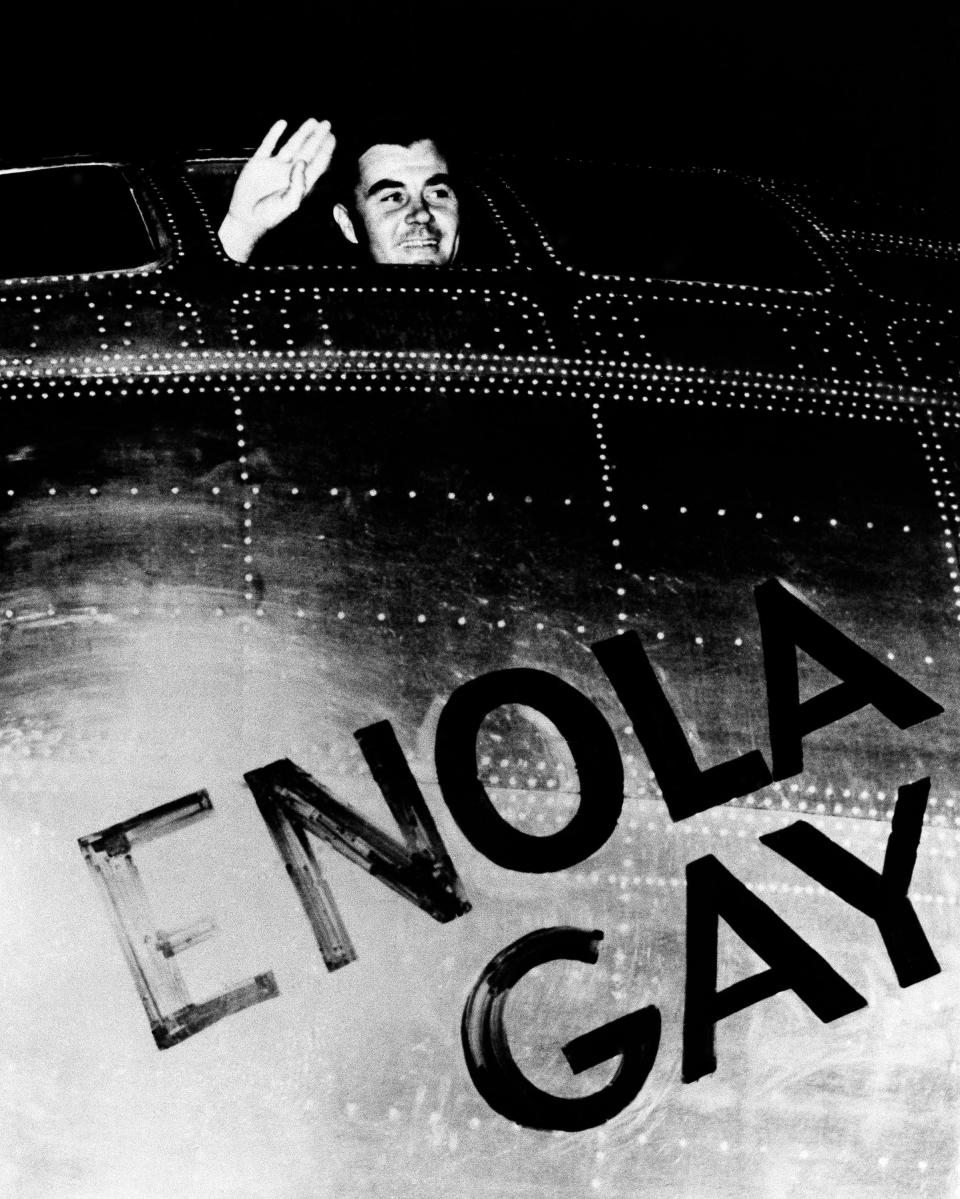Elmira's connection with Paul Tibbets Jr. and the Enola Gay
- Oops!Something went wrong.Please try again later.
On June 26, 1940, young pilot Lt. Paul W. Tibbets, Jr., was summoned to aid Col. Samuel R. Hopkins, whose wife and son were in a terrible automobile accident near Elmira.
Mrs. Anne Hopkins, and her 17-year-old son, Archie, were traveling en route from Madison Barracks in Sackets Harbor, New York, to Gainesville, Florida. The accident occurred on the Elmira-Ithaca highway (where the roundabout crosses Old Ithaca Road today) during a rainstorm. The car skidded and hit a tree, almost instantly killing Mrs. Hopkins and badly injuring Archie. Archie was not expected to live long, and Col. Hopkins needed to get to Elmira as soon as possible.
Hopkins left on a flight from Fort Benning, Georgia, at 3:30 p.m. and arrived in Elmira at 9:30 p.m., covering 1,000 miles in six hours. He traveled in an Army plane piloted by Tibbets.
In a 1998 letter to Robert Brennan, father of former Chemung County Historical Society director Constance Barone, Mr. Tibbets recalled the story in his own words:

I remember being at the hanger at Lawson Field, Ft. Benning, Georgia) and the CO, Maj. Rubin Kyle, called me into his office, where there were two officers, and told me that the Colonel’s family had just had an accident near Elmira, and he wanted to get there as soon as he could and had come to the field to see if some pilot would take him there. Since I was the only “junior” one around would I do it: I was more than happy to help, so we got started quickly. Pre-war duty hours were normally 7:30 to 4:00, with some leaving by 3:00 if things were slow.
We were in an 0-47 (O for observation), which was only good for 400 miles before refueling. As I remember, there were thunderstorms and low clouds forecast for the Elmira area. We went to Bolling Air Force Base at Washington D.C., then direct to Elmira. We encountered scattered storms about 50 to 60 miles south of Elmira. I located the Elmira airport by working my way around and through some of the weather. It was a dark field with no boundary lights on the runways, so I resorted to SOP (standard operation procedure) and flew close to their Operations Shack. As I cut the engine, a police car pulled up, then another car arrived. It was someone to pick up the Colonel. He thanked me for the ride and then got in the car and departed.
Economy:As NY schools struggle to fill jobs, one Southern Tier superintendent is driving the bus
NY news:5 challenges Kathy Hochul faces in 2023 as she starts first full term as NY governor
COVID:New York laws seek to crack down on COVID fraud. What you should know
The remaining man, I think, was the sheriff. He helped me tie down the plane and then asked me what I wanted to do. My answer was, “eat, then sleep.” He said he could accommodate me on both if I did not mind sleeping in a cell. He assured me it was clean and comfortable if I was tired enough. By now, it was about 11:00 PM. I accepted the sheriff’s offer, and away we went. We went to what I think was the county jail, and he sent for a couple of sandwiches and coffee. After twelve o’clock, he bowed out after asking me what time I wanted to go to the airport the next morning. The next morning, the deputy on duty brought coffee as soon as I got up. The sheriff took me to the airport, and I remained until I was airborne.
One of the reasons I remember the incident is the security check question: “Have you ever been in jail?” And I always answer, “Yes.” And I tell them the Elmira story.
On August 6, 1945, at 8:15:17 a.m., a B-29 aircraft named the Enola Gay, piloted by Tibbets dropped a four-and-a-half-ton “Little Boy” atomic bomb over the city of Hiroshima, Japan. Enola Gay was the name of Tibbet’s mother.
What happened to young Archie Hopkins? He suffered a skull fracture, a broken jaw, and a broken neck. He died three days later at St. Joseph’s Hospital.
Diane Janowski is the Elmira city historian. Her column appears monthly.
This article originally appeared on Binghamton Press & Sun-Bulletin: Elmira history includes Enola Gay, Paul Tibbets connection

